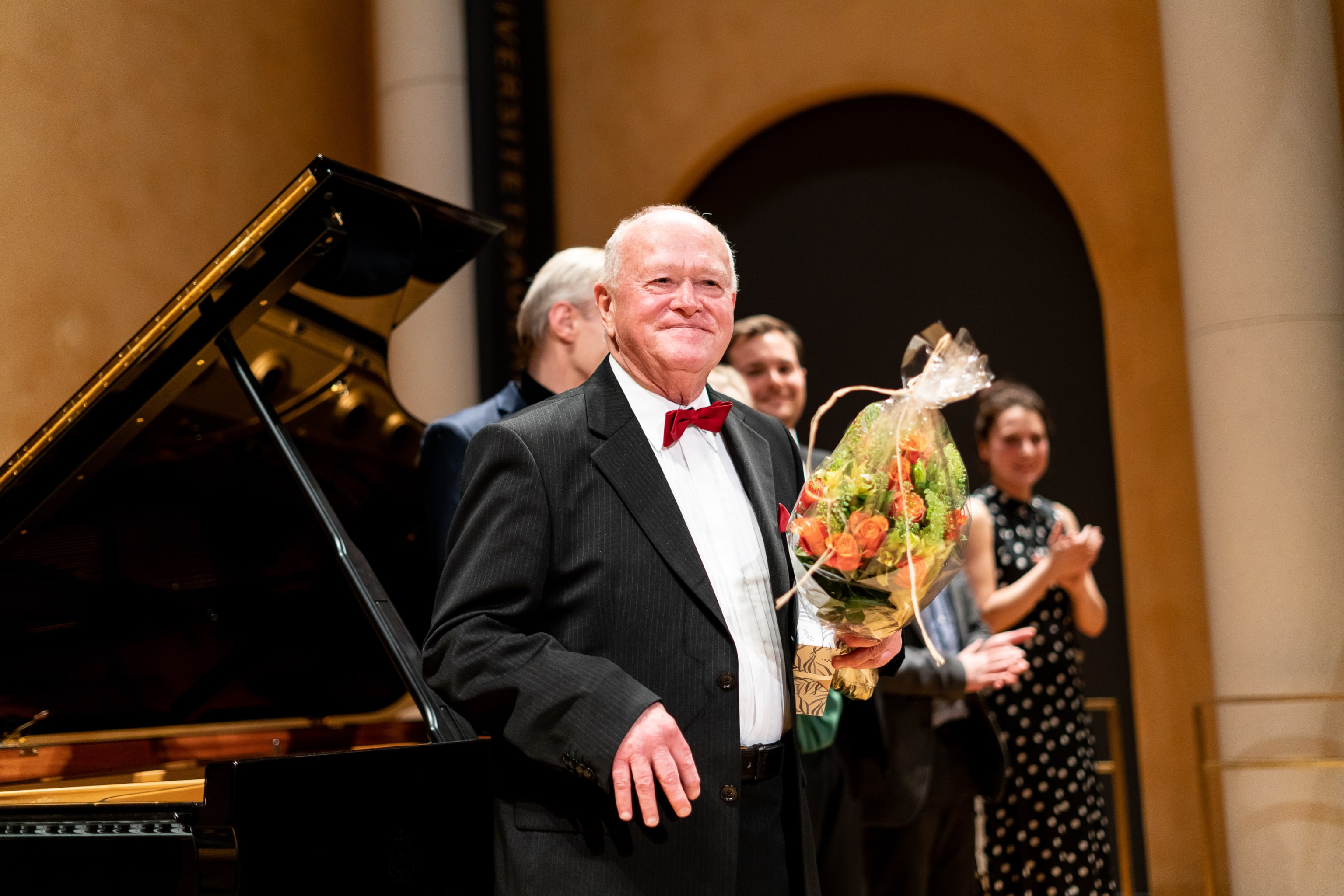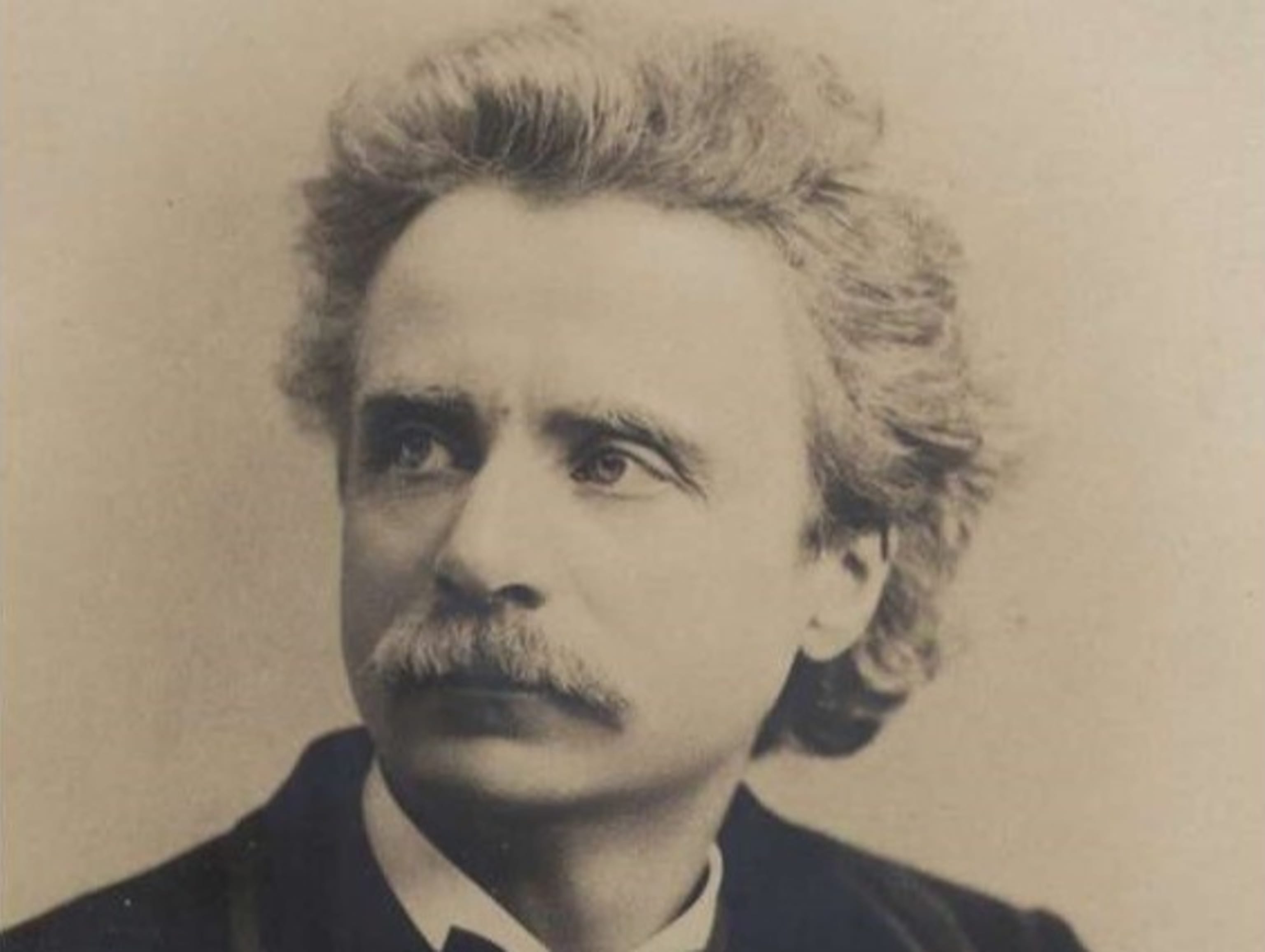Tradition in A minor
- Home
- Festival
- 2021
- Articles
- Tradition in A minor
- By:
By: Ketil Mosnes,
March 19, 2021
A closer look at one of Edvard Grieg’s most famous works, and its role as one of the festival’s longest-running traditions.
When the very first Bergen International Festival took place in 1953, Edvard Grieg's Piano concerto in A minor, Opus 16 (sometimes just called the piano concerto) was staged with Robert Riefling as soloist. Since then, the concerto has been performed at the festival every single year, except in 1955 and 2011, and can thus be said to be one of the most traditional of the festival's annual events. The concerto was composed in 1868, and is considered one of the world's most famous piano concertos. The 25-year-old Edvard Grieg worked on the concerto’s score during a summer holiday stay in Søllerød in Denmark, and reportedly wrote the entire piano part within a few months inside a small greenhouse. The premiere took place in Copenhagen on April 3, 1869, with the concerto’s dedicatee, Edmund Neupert, as soloist. The performance was a great success, however Grieg himself did not have the opportunity to attend, as he had an assignment as conductor in Oslo the same evening.
The performance was reportedly interrupted by spontaneous applause several times, and Grieg's friend Benjamin Feddersen later conveyed the following observation to the composer:
'Your composition was followed with great interest. While my ears were preoccupied with your tones, I did not take my eyes off the notables in the concert venue for a moment. I observed and understood every mine, every movement, and I dare to assure you that Gade, Hartmann, Rubinstein and Winding were filled with joy and admiration for your work. When Neupert paused for the first time in the first movement, Rubinstein eagerly clapped his hands together, as did Gade, Hartmann and Winding. I regret that you yourself did not get to have the joy and pleasure it was to hear this unusual work.’ Since then, the concerto’s popularity has grown significantly around the world. Most pianists keep it in their standard repertoire, and it is considered one of the most frequently performed works within its genre. The score is written for an ensemble of two flutes, two oboes, two clarinets, two bassoons, four horns, two trumpets, three trombones, timpani, violins, viola, cellos and double basses. The concerto has been performed 66 times at the festival. Among its soloists, we find Sviatoslav Richter (1968), András Schiff (1982), Kjell Bækkelund (1957), Noriko Ogawa (1999), Eva Knardahl (1969 og 1984), Håkon Austbø (1973 og 2003) and Leif Ove Andsnes (1988, 1993 og 2002). Bergen International Festival asked a selection of the former soloists three questions about Grieg’s masterpiece. The questions were as follows:
1. Do you remember the first time you heard the concerto, and if so, how did you react?2. Is there any particular musician that you would love to hear as soloist during the concerto?3. Patrick Dinslage, who wrote the book Edvard Grieg und seine Zeit claims that Grieg copied the style and character of Norwegian folk music in his concerto. Do you agree?
Liv Glaser (soloist in 1962):
1. The first time I heard the piano concerto was probably in my mother's womb. She was a pianist! However I believe my first real encounter with the concerto was in 1945, right after the war; in the first autumn season in the University Hall with the Oslo Philharmonic, Ivar Johnsen as soloist, and conductor Odd Grüner-Hegge. The family had returned home after a dramatic flight to Sweden in 1942, and my father was again in the concertmaster position. Ivar Johnsen's spontaneous and colourful play made a strong impression, and tears ran down my face during the second movement. The piano concerto has always meant a lot to me, and I had the great honour and experience of playing it at the 1962 edition of the Bergen International Festival. However the most exotic experience was in Jerusalem in 1968, with conductor Mendi Rodan and a sound engineer named Prokofiev!2. It would have been interesting to hear Alicia de Larrocha play the concerto at the festival! In many ways, this Spanish pianist reminds me of one of my favourites growing up; the Hungarian Annie Fischer. She has an amazing technique and timbre, and a captivating rhythm! But most importantly, a very special enchanting presence in the music that goes straight to the heart. That would have been something for Grieg!
Clara Schumann herself as soloist. Grieg does not literally copy folk tunes in the concerto, but to a certain extent the character, which we hear in parts like the halling and springdans from the concerto's last movement. And I am convinced that Grieg's lyrical vein in the concerto, echoed by an almost religious sense of nature, is what makes it so celebrated all over the world!
Håkon Austbø (soloist in 1973 and 2003):
1. It must have been when I was around seven or eight years old; when my father played it in the Kongsberg church, and had practiced at home beforehand. I was looking forward to playing it myself, however that would take a few years, and when it finally happened it was at the Bergen International Festival in 1973.
2. Did Martha Argerich play the concerto? Among the younger performers, Trifonov would have been an interesting choice.
3. Of course there are both halling rhythms and approaches to Lydian harmonization here, so that's right enough. His relationship to folk music, however, was far from clarified at that time.
Håvard Gimse (soloist in 1996):
1. Actually, I'm not sure when I first heard the piano concerto. When I was a child, I heard it with Eva Knardahl, Jens Harald Bratlie and Robert Riefling at a concert, and I already knew it by then. I had probably heard parts of it on the radio several times.
2. There are many. I don’t think I am familiar with entire list of the concerto soloists at the Bergen International Festival, but Krystian Zimerman and Radu Lupu would both have been exciting, as well as a revived Dinu Lipatti or Vladimir Horowitz. I would gladly have paid a lot to hear Gunilla Süssmann. Also, through my teaching career at the Academy of Music in Oslo, I have worked with some of the most gifted students who have studied there. Marina Kan Selvik for example, or Christian Sommerfelt or Christian Grøvlen… It would be exciting to experience them as soloists.
Sigurd Slåttebrekk (soloist in 2008):
1. I do not really remember when I first heard it. I grew up with music, and the piano concerto is part of the cultural baggage that has always just been there.
2. There are many new names - both Norwegian and international - that would be exciting to invite to the festival as soloists, but two brilliant and experienced Norwegian pianists who have not yet been given this assignment are Sveinung Bjelland and Tor Espen Aspaas. I am sure that both of them - in their own way - would be able to highlight the concerto with a distinctive character.
3. No one can disagree with Patrick Dinslage in that both the piano concerto and much of Grieg's other music show clear connections to Norwegian folk music. I myself have researched Grieg as a performer, and in Grieg's own performances one also sees this evident connection to folk music - with the strong accentuations and the ongoing drive. What is most surprising however, is how the performer Grieg appears as the European Grieg, and thus demonstrates a clear relationship with his contemporary great European performers and composers. With his tempo treatment, phrasing and line playing, Grieg stands in a romantic, European performance tradition that has since disappeared, and which in my opinion is by far the most important door opener for new understandings and new experiences of his music.
Marianna Shirinyan (soloist in 2013):
1. I don’t remember the very first meeting, but back at my music school in Armenia the Grieg concerto was a repertoire piece which almost every piano student was supposed to play. I remember passing by the different class rooms, hearing the concerto being played by older students, and I dreamt of the moment when I would finally be allowed to play that incredible concerto myself. At some point that moment occurred, and I was the happiest girl.
2. I would have loved to experience Percy Grainger live with this concerto. His recordings and approach to the piece is precious.
3. It might be wrong to use the word “copied”. Grieg was growing up with Norwegian folk music in the breathtakingly beautiful Norwegian nature. That must have shaped him both as a musician and a composer. In my opinion some of the best music comes in some way from folk music. I’m thinking of Mozart, Brahms, Dvorak, Nielsen, Khachaturian and Sibelius….The list is long, and they all mirror their culture, landscape and folk music. In that sense Grieg’s piano concerto is a masterpiece.
Supported by Vestland county council



